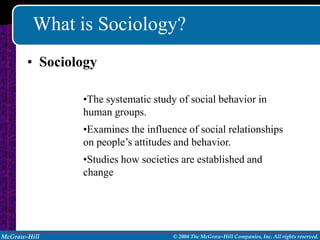More Related Content
Similar to Sociology (20)
Sociology
- 1. What is Sociology?
• Sociology
•The systematic study of social behavior in
human groups.
•Examines the influence of social relationships
on people’s attitudes and behavior.
•Studies how societies are established and
change
McGraw-Hill © 2004 The McGraw-Hill Companies, Inc. All rights reserved.
- 2. What is Sociology?
The Sociological Imagination
• Definition: An awareness of the relationship between an
individual and the wider society.
• It is the ability to view our own society as an outsider might,
rather than from the perspective of our limited experiences
and cultural biases.
McGraw-Hill © 2004 The McGraw-Hill Companies, Inc. All rights reserved.
- 3. What is Sociology?
Sociology and the Social Sciences
• In contrast to other social sciences, sociology emphasizes the
influence that groups can have on people’s behavior and
attitudes and the ways in which people shape society.
McGraw-Hill © 2004 The McGraw-Hill Companies, Inc. All rights reserved.
- 4. What is Sociology?
Sociology and Common Sense
• Knowledge that relies on “common sense” is not always
reliable.
• Sociologists must test and analyze each piece of information
that they use.
McGraw-Hill © 2004 The McGraw-Hill Companies, Inc. All rights reserved.
- 5. What is Sociological Theory?
•Theory: An attempt to explain events, forces,
materials, ideas or behavior in a comprehensive
manner.
•Sociological Theories: Seek to explain
problems, actions, or behavior.
•Effective theories should explain and predict.
•Sociologists employ theories to examine the
relationships between observations or data that
may seem completely unrelated.
McGraw-Hill © 2004 The McGraw-Hill Companies, Inc. All rights reserved.
- 6. The Development of Sociology
Prominent Contributors to Sociological Thought
1798 1857
Auguste Comte
1802 1876
Harriet Martineau
1820 1903
Herbert Spencer
1818 1883
Karl Marx
1858 1917 The “time lines” shown
Émile Durkeim
1860 1935
here give an idea of
Jane Addams
1863 1931
relative chronology.
George Herbert Mead
1864 1920
Max Weber
1864 1929
Charles Horton Cooley
1868 1963
W.E.B. Du Bois
1902 1979
Talcott Parsons
1910
Robert Merton
1916 1962
C. Wright Mills
1922 1982
Erving Goffman
Source: Figure 1-2 (p.15) in Richard T. Schaefer and Robert P. Lamm,
McGraw-Hill Sociology: An Introduction. 5th ed. New York: McGraw-Hill.
© 2004 The McGraw-Hill Companies, Inc. All rights reserved.
- 7. Major Theoretical Perspectives
Functionalist Perspective
•Emphasizes the way that parts of a society are
structured to maintain its stability.
•Views society as a vast network of connected parts,
each of which helps to maintain the system as a
whole.
•Each part must contribute or it will not be passed on
from one generation to the next.
McGraw-Hill © 2004 The McGraw-Hill Companies, Inc. All rights reserved.
- 8. Major Theoretical Perspectives
Functionalist Perspective
Manifest Functions of institutions are
open, stated, conscious functions. They involve the
intended, recognized, consequences of an aspect of
society.
•Latent Functions are unconscious or unintended
functions and may reflect hidden purposes of an
institution.
McGraw-Hill © 2004 The McGraw-Hill Companies, Inc. All rights reserved.
- 9. Major Theoretical Perspectives
Functionalist Perspective
•Dysfunctions
•A dysfunction is an element or a process of society
that may actually disrupt a social system or lead to a
decrease in stability.
McGraw-Hill © 2004 The McGraw-Hill Companies, Inc. All rights reserved.
- 10. Major Theoretical Perspectives
Conflict Perspective
•Assumes that social behavior is best understood in
terms of conflict or tension between competing
groups.
•Conflict is not necessarily violent.
•Conflict can be over economics or over competing
values.
Continued...
McGraw-Hill © 2004 The McGraw-Hill Companies, Inc. All rights reserved.
- 11. Major Theoretical Perspectives
Conflict Perspective
•The Marxist View: Conflict is seen not merely as a
class phenomenon but as a part of everyday life in all
societies.
•This view emphasizes social change and
redistribution of resources, making conflict theorists
more radical than functionalists.
Continued...
McGraw-Hill © 2004 The McGraw-Hill Companies, Inc. All rights reserved.
- 12. Major Theoretical Perspectives
Conflict Perspective
•A Racial View: W.E.B. DuBois: Encourages
sociologists to view society through the eyes of those
segments of the population that rarely influence
decision making.
•Sociology, contended DuBois, had to draw on
scientific principles to study social problems such as
those experienced by Blacks in the United States.
Continued...
McGraw-Hill © 2004 The McGraw-Hill Companies, Inc. All rights reserved.
- 13. Major Theoretical Perspectives
Interactionist Perspective
•Generalizes about everyday forms of social
interaction in order to understand society as a whole.
•Interactionism is a sociological framework for
viewing human beings as living in a world of
meaningful objects. These “objects” may include
material things, actions, other people, relationships,
and even symbols.
McGraw-Hill © 2004 The McGraw-Hill Companies, Inc. All rights reserved.
- 14. Major Theoretical Perspectives
• Feminist Perspective
•Definition: Views inequity in gender as central to all
behavior and organization.
•Unlike conflict theory, with which it is sometimes
allied, the feminist perspective often focuses on the
micro-level relationships of everyday life, just as
interactionists do.
McGraw-Hill © 2004 The McGraw-Hill Companies, Inc. All rights reserved.
- 15. Major Theoretical Perspectives
• The Sociological Approach
•Sociologists make use of all four perspectives.
•Each perspective offers unique insights into the same
issue.
McGraw-Hill © 2004 The McGraw-Hill Companies, Inc. All rights reserved.
